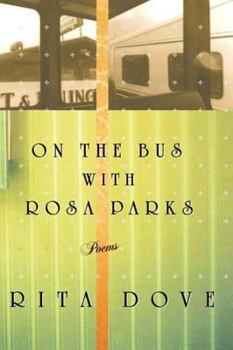On the Bus with Rosa Parks: Poems
Select Format
Select Condition 
Book Overview
In these brilliant poems, Rita Dove treats us to a panoply of human endeavor, shot through with the electrifying jazz of her lyric elegance. From the opening sequence, "Cameos", to the civil rights struggle of the final sequence, she explores the intersection of individual fate and history.
Format:Paperback
Language:English
ISBN:039332026X
ISBN13:9780393320268
Release Date:April 2000
Publisher:W. W. Norton & Company
Length:94 Pages
Weight:0.35 lbs.
Dimensions:0.4" x 5.5" x 8.2"
Related Subjects
PoetryCustomer Reviews
3 ratings
Joining Rita's Bus
Published by Thriftbooks.com User , 19 years ago
This collection of poems is a fun variety of rhythm, imagery and humour. I found this collection a great daily read. The first set of poems, "Cameos" are wonderful snapshots of the African American community. Dove does something that is very difficult and takes on the voice of different generations and genders in the same family to let us see inside the group. July 1925 had a great story. "Night" had a great rhythm and "Lake Erie" had wonderful unusual imagery. As the collection progresses we move to more stand alone poems but they are all there to create new voices. She does what a good poet wants and takes a common theme and makes it new. A perfect example is "Parlor." We are dealing with death but with a bit of humour in the background. The later poems are from a series on civil rights and Rosa Parks and are just as intriguing as the earlier voices, the views of a culture different from my own. I took away from this collection that it was not a book about civil rights as so many thought from the title. But that it is a book about "Riding the Bus with Rosa Parks" in the sense that the African American community, especially the female sector, want to join that tradition and to honor what it means to be a part of the sector of the community. If you want to read a very talented poet then I strongly suggest this collection. As noted, it isn't a collection soley focusing on civil rights. It is an anthology of unique voices.
Don't judge a book by its title...
Published by Thriftbooks.com User , 23 years ago
At first glance, one may think this book to be a collection of poems dealing with the civil rights movement. Dove illustrates her poetic talent, however, by writing about the struggles in the lives of her fictional characters. In fact, the only references to Rosa Parks are in the chapter named after the book itself. But by looking beneath the surface of Dove's poems, it becomes clear to the reader why "On the Bus With Rosa Parks" is a very appropriate title. Rita Dove uses Rosa Parks as a sort of personification of the recurring themes in the poems. Rosa Parks represents hope, living life to its fullest, and the idea of ordinary people overcoming adversity to do something extraordinary. It's wrong to downplay this work and say Dove was too young to accurately illustrate Rosa Parks' effect on the Civil Rights Movement. For one thing, I think we all know of her significance, no matter what age or race we are. But also, a reader of this book needs to look past the title and see that this is not just about Rosa Parks, it outlines *human* struggle, not just African American struggle. I highly recommend it...
Rita Dove at her best
Published by Thriftbooks.com User , 25 years ago
Rita Dove displays a range of poetic devices and a power of lyrical language that is truly amazing. Although she's black, she speaks to everybody, even an old-fashioned white guy like me.






